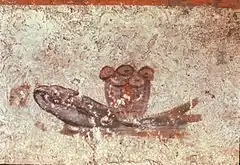Variations of the ichthys symbol
The Ichthys symbol (or "Jesus fish") is a sign typically used to proclaim an affiliation with or affinity for Christianity. The fish was originally adopted by early Christians as a secret symbol, but the many variations known today first appeared in the 1980s. Some of these are made by Christians in order to promote a specific doctrine or theological perspective, such as evolutionary creation. Other variations are intended for the purpose of satire by non-Christian groups.


Both the traditional ichthys fish as well as its variations, are often seen adorning the bumpers or trunks of automobiles mainly in the USA, often in the form of adhesive badges made of chrome-colored plastic.
Ichthys symbol
An ancient Hellenistic Christian slogan espoused the Greek acronym/acrostic[1] ΙΧΘΥΣ (ichthys) for "Ἰησοῦς Χριστός, Θεοῦ Υἱός, Σωτήρ" ("Iēsous Christos, Theou Yios, Sōtēr"), which translates into English as 'Jesus Christ, Son of God, Saviour'; the Greek word ichthys translating to 'fish' in English. The first appearances of fish symbols as adopted in Christian art and literature date to the 2nd century CE. Some modern fish symbol variations, called the Jesus fish, contain the English word Jesus in the center, or are empty entirely.[2]
Parodies

Jeroen Temperman states that there are "variations on this Ichthys symbol. Some variations add feet to the fish and inscribe Darwin in the body. Others make reference to sushi, sharks, the food chain, fast food, the devil or death. How are we to interpret these variations? These adaptations are themselves susceptible to multiple interpretations, ranging from humour to critique, to mocking derision, to blasphemy."[2] Among such parodies are the Darwin fish, often displayed by "atheists and freethinkers" in the United States,[3] and the Fish-hungry shark, displayed by Muslims in Egypt.[4]
Responses
Another variation has been offered by people who see no conflict between Christian belief and the evidence of science regarding evolution: a depiction of the Jesus fish and the Darwin fish kissing. Such images have been sold as bumper stickers and have also been improvised.[5] The writer Michael Dowd, author of the book Thank God for Evolution, has been among the more prominent promoters of this image.[6]
Criticism
Rhetorical scholar Thomas Lessl conducted a survey of users of the Darwin fish emblem. Based on their responses, he interprets the symbol as scientific "blackface", a parody that is one part mockery and one part imitation.[7] Lessl suggests that the "various ideas that users plainly compress into this emblem are suggestive of scientism", and adds that the Darwin fish is an advertisement for the conflict thesis, an idea, which according to Lessl, is "now thoroughly discredited by historians".[7]
Jonah Goldberg, in the Los Angeles Times criticized the Darwin fish, stating that:
I find the Darwin fish offensive. First there's the smugness. The undeniable message: Those Jesus fish people are less evolved, less sophisticated than we Darwin fishes. The hypocrisy is even more glaring. Darwin fish are often stuck next to bumper stickers promoting tolerance or admonishing random motorists that "hate is not a family value." But the whole point of the Darwin fish is intolerance; similar mockery of a cherished symbol would rightly be condemned if aimed at blacks or women or, yes, Muslims.[8]
In the National Review, Goldberg further stated that "one of the problems with the Darwin Fish is that it assumes all Jesus Fishers are Creationists. And I agree that this is one of the problems. But it is not the only one. The 'evolve' fish, I think has a double-meaning in that it suggests Christians should evolve from Christianity. I also think mucking about with the symbol of the fish is itself offensive because the symbol is sacred and has no secular counterpart."[9]
Star Trek

The "Trek Fish" although still fish-shaped, with the legend "TREK" inside, the "fins" parody the iconic shape of the USS Enterprise.[10]
Cthulhu

Cthulhu is a fictional giant creature, one of the Great Old Ones in H. P. Lovecraft's Cthulhu Mythos. It is often cited for the extreme descriptions given of its appearance, size, and the abject terror that it invokes. Cthulhu is often referred to in science fiction and fantasy circles as a tongue-in-cheek shorthand for extreme horror or evil. It also has been depicted in a parody of the ichthys.
Artgemeinschaft
The German Artgemeinschaft group, promoting racist neopaganism, uses a registered symbol showing an eagle catching an ichthys fish.[11][12]
Fish-hungry sharks
In Egypt, many Coptic Orthodox Christians display the fish symbol on their vehicles as a sign of their faith, and Islamic fundamentalists responded with "fish-hungry sharks", some including the phrase "no god but Allah" within the body of the shark.[4] One Egyptian Muslim was quoted in The Day as saying "The Christians had the fish so we responded with the shark. If they want to portray themselves as weak fishes, OK. We are the strongest."[4]
References
- Christian H. Bull, Liv Ingeborg Lied, John D. Turner, editors (2012). Mystery and Secrecy in the Nag Hammadi Collection and Other Ancient Literature: Ideas and Practices. Leiden, The Netherlands: Koninklijke Brill NV. p. 327. ISBN 978-90-04-21207-7.CS1 maint: multiple names: authors list (link)
- Temperman, Jeroen (6 September 2012). The Lautsi Papers: Multidisciplinary Reflections on Religious Symbols in the Public School Classroom. Martinus Nijhoff Publishers. p. 43. ISBN 9789004222519.
It stands for or represents something other than itself, that something else being Jesus Christ. It is directed primarily at some audience that knows how properly to interpret the symbol. It is on one level a reference to our invocation of Christ's invitation in Matthew to become "fishers of men". But it incorporates additional means as well. The fish symbol is a pictorial representation of the Greek word Ichthys, which was itself used as an acronym for Iesous Christos, Theou Yios, Soter, meaning "Jesus Christ, God's Son, Savior". We also see variations on this Ichthys symbol. Some variations add feet to the fish and inscribe "Darwin" in the body. Others make reference to sushi, sharks, the food chain, fast food, the devil or death. How are we to interpret these variations? These adaptations are themselves susceptible to multiple interpretations, ranging from humour to critique, to mocking derision, to blasphemy.
- Hoover, Stewart M.; Clark, Lynn Schofield (January 2002). Practicing Religion in the Age of the Media: Explorations in Media, Religion, and Culture. Columbia University Press. p. 277. ISBN 9780231120890.
Atheists and freethinkers have a visible presence in the United States. Many encounter them first through seeing a Darwin's Fish bumper sticker on a car.
- Michael, Maggie (30 November 2003). "Christian fish, Muslim shark swimming through Cairo traffic in war of stickers". The Day. Retrieved 12 April 2015.
First came the fish bumper stickers, imported from the United States and pasted on cars by members of Egypt's Coptic minority as a symbol of their Christianity. Before long, some Muslims responded with their own bumper stickers: fish-hungry sharks. The stickers are sold in Islamic bookshops and some also come plain or fancy – some with the Arabic phrase "No god but Allah" printed in the shark's body. Emad, a Muslim, laughed when asked about the competing symbols but was unapologetic about the two shark stickers on his car. "The Christians had the fish so we responded with the shark. If they want to portray themselves as weak fishes, OK. We are the strongest," said Emad who would only give his first name.
- Borgeson, Phina (2009, February 13)."Evolution and faith in dialogue." Episcopal News Service. https://www.episcopalchurch.org/library/article/evolution-and-faith-dialogue
- http://michaeldowd.org/photos/
- Lessl, Thomas M. (2007). "The Culture of Science and the Rhetoric of Scientism: From Francis Bacon to the Darwin Fish". Quarterly Journal of Speech. 93 (2): 123–149. doi:10.1080/00335630701426785. ISSN 0033-5630. S2CID 59016185.
- Goldberg, Jonah (1 April 2008). "Evolution of religious bigotry". Los Angeles Times. Retrieved 12 April 2015.
- Goldberg, Jonah (2 April 2008). "Jesus Fish Agonistes". National Review. Retrieved 12 April 2015.
- Image of the Roddenberry "Trek Fish" from the Roddenberry website
- Artgemeinschaft
- Registration

